Cocaine can have various effects on the respiratory system, and its impact on the lungs can be harmful. Here are some ways in which cocaine affects the lungs:
- Irritation and Inflammation: Cocaine is a powerful stimulant that can cause irritation and inflammation of the respiratory tract when it is inhaled. This can lead to symptoms such as coughing, wheezing, and shortness of breath.
- Vasoconstriction: Cocaine has vasoconstrictive properties, meaning that it narrows blood vessels. This includes the blood vessels in the lungs. Reduced blood flow to the lungs can result in decreased oxygen exchange and may contribute to respiratory issues.
- Pulmonary Edema: Cocaine use has been associated with the development of pulmonary edema, which is the accumulation of fluid in the lungs. This condition can lead to difficulty breathing and can be life-threatening.
- Crazy Paving
- reports of crazy paving patterns on CT scans in individuals with a history of inhalational drug abuse, including cocaine.
- Subpleural Sparing
- presence of subpleural sparing may be seen in some cases of crack lung. This pattern may indicate that the changes in the lungs are not uniform and may be more pronounced away from the pleura.
55 year old male with substance use disorder
Cocaine Inhalational Pneumonitis Suspected
Upper Lung Field Distribution
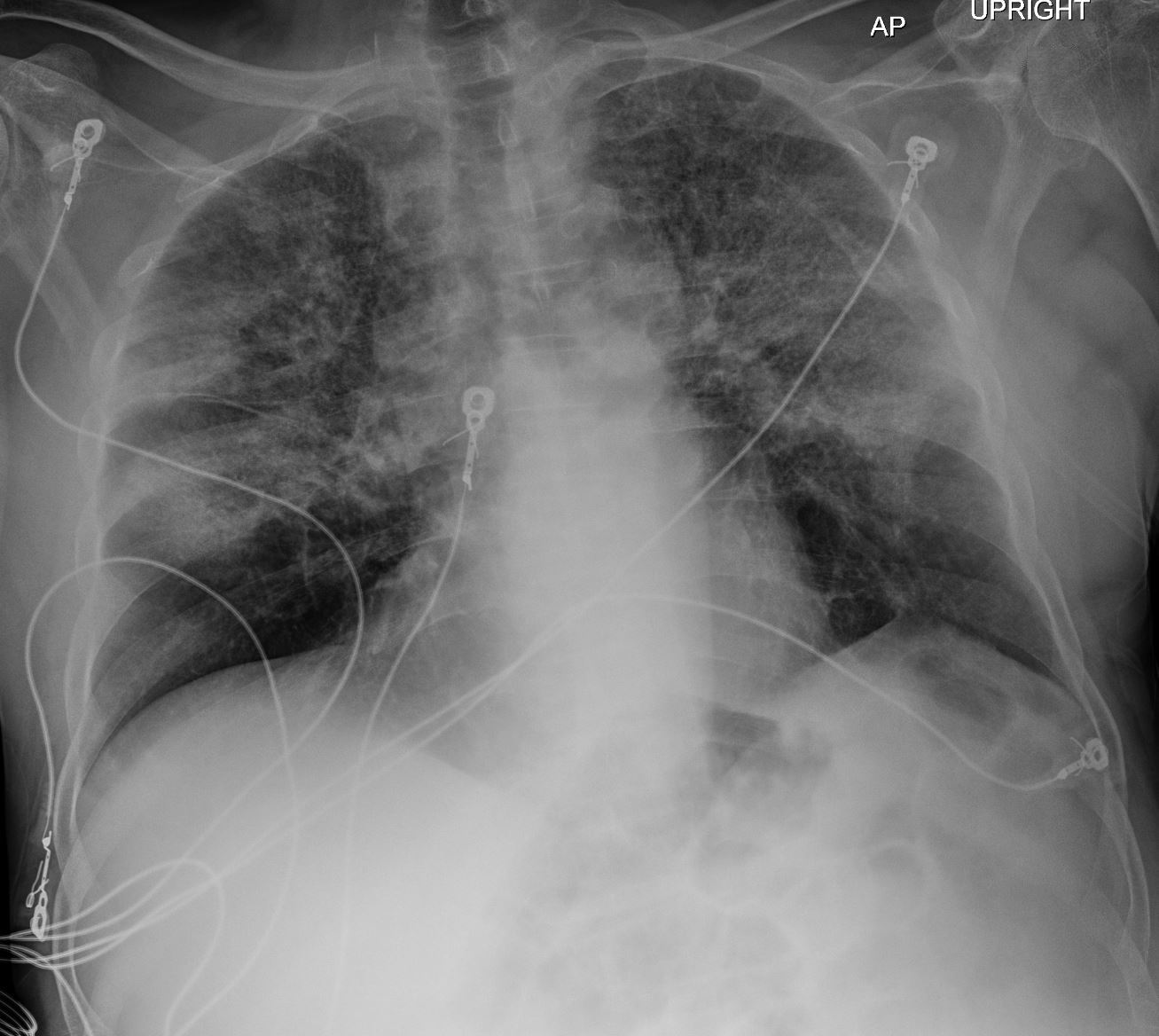
55 year old male with substance use disorder presents with progressive and now more severe dyspnea. Frontal CXR shows extensive upper lobe ground glass changes in the upper lobes. Inhalational pneumonitis was suspected with multifocal regions of consolidation.
Progressive inhalational pneumonitis from smoking or cocaine inhalation was suspected
Ashley Davidoff MD TheCommonVein.net 251Lu 135918
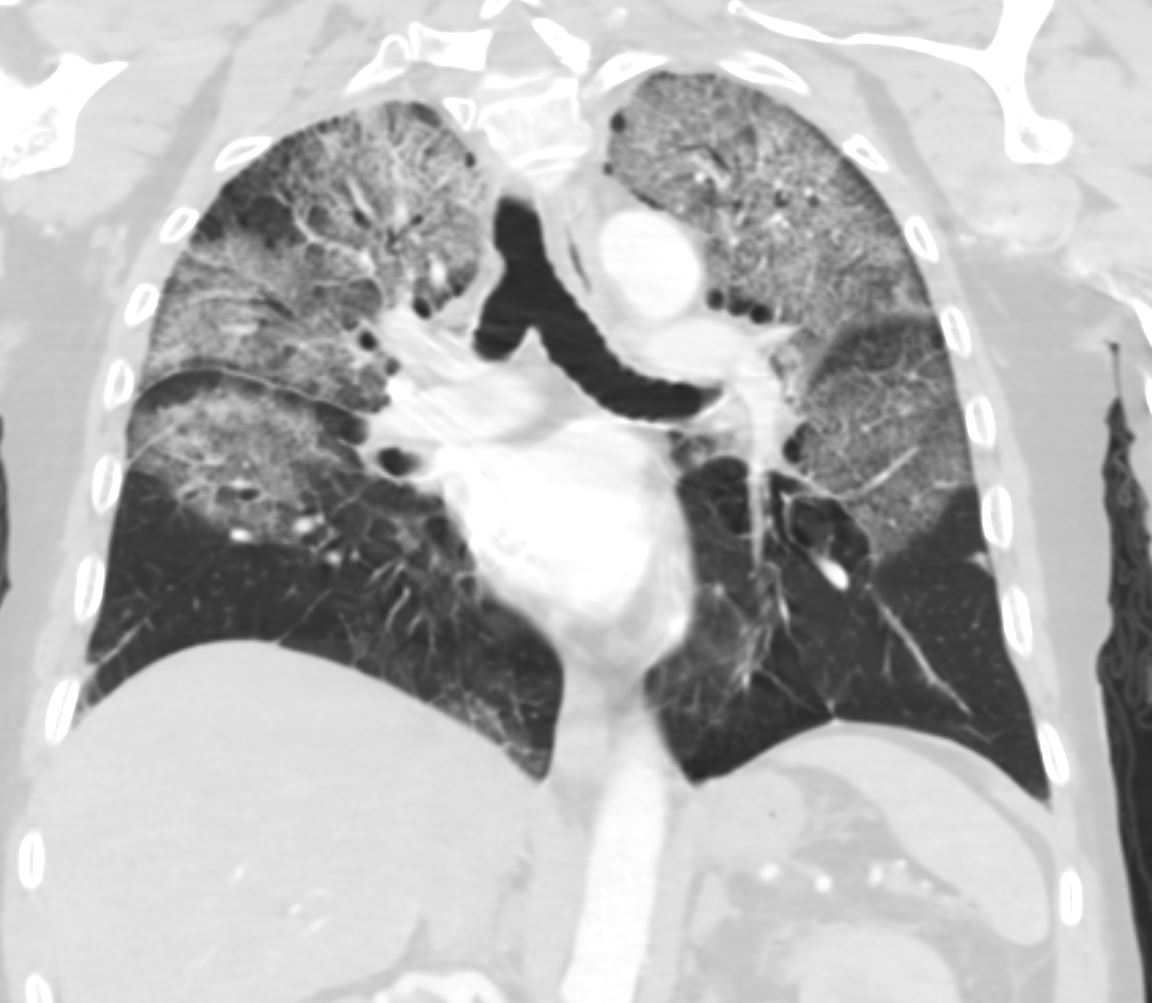
55-year-old male with substance use disorder presents with progressive and now more severe dyspnea. Coronal CT through the mid lung fields shows upper lobe predominant ground glass changes with thickening of the interlobular septa and a “crazy paving” appearance is suggested. The superior segments of the lower lobes are also involved. Subpleural sparing is suggested. Thickening and irregularity of the right and left major fissures and the transverse fissure are noted.
Progressive inhalational pneumonitis from smoking or cocaine inhalation was suspected. DIP and hypersensitivity pneumonitis remained in the differential diagnosis
Ashley Davidoff MD TheCommonVein.net 251Lu 135935
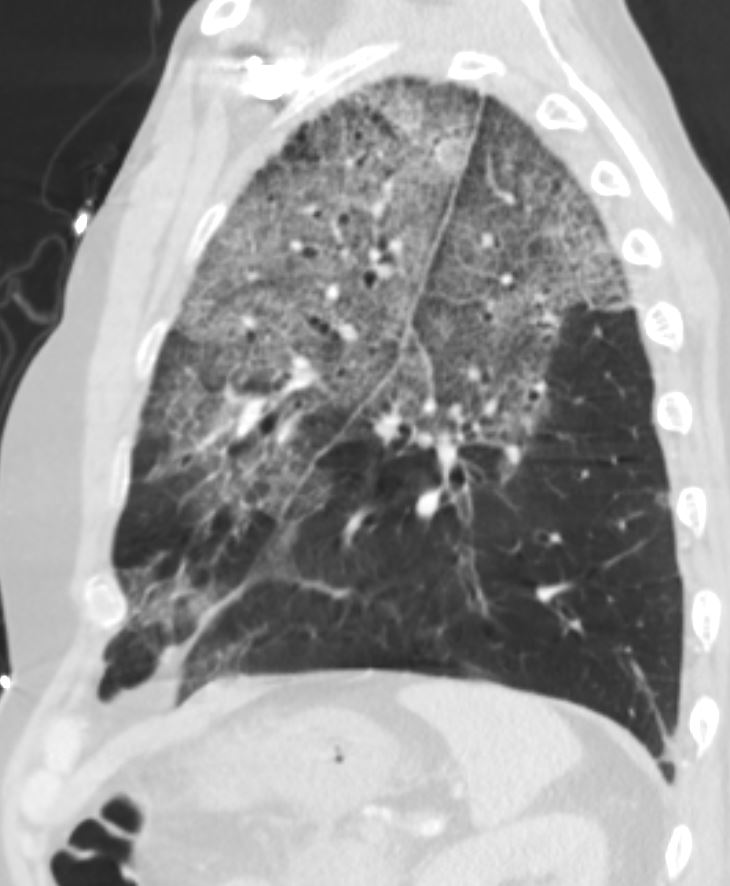
55-year-old male with substance use disorder presents with progressive and now more severe dyspnea. Sagittal CT through the left lung field shows ground glass changes in the upper mid and superior segment of the lower lobe. The fissures of the areas of involved lung are focally thickened. There is subpleural sparing.
Progressive inhalational pneumonitis from smoking or cocaine inhalation was suspected. DIP and hypersensitivity pneumonitis remained in the differential diagnosis
Ashley Davidoff MD TheCommonVein.net 251Lu 135942
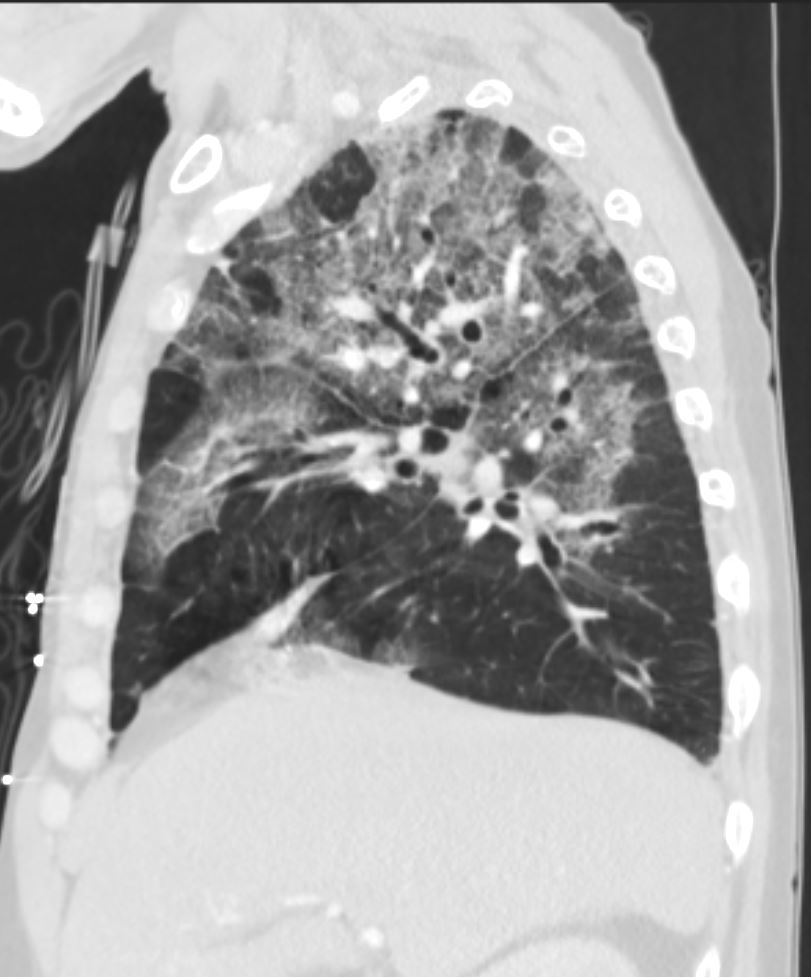
55-year-old male with substance use disorder presents with progressive and now more severe dyspnea. Sagittal CT through the right lung field shows ground glass changes in the upper mid and superior segment of the lower lobe. The fissures of the areas of involved lung are focally thickened
Progressive inhalational pneumonitis from smoking or cocaine inhalation was suspected. DIP and hypersensitivity pneumonitis remained in the differential diagnosis
Ashley Davidoff MD TheCommonVein.net 251Lu 135939
Subpleural Sparing
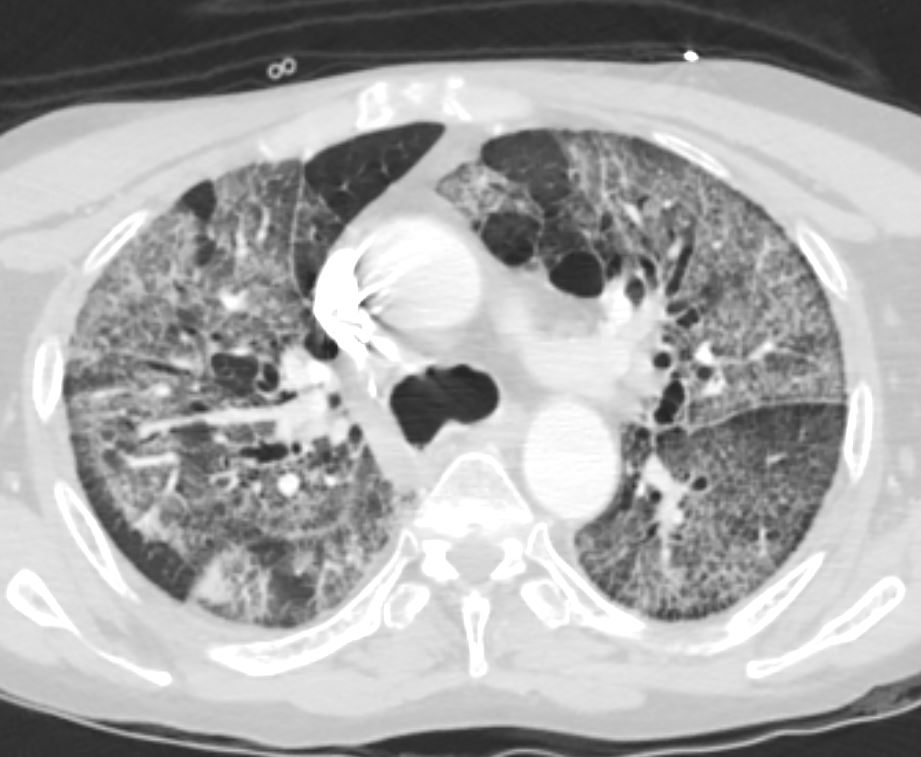
55 year old male with substance use disorder presents with progressive and now more severe dyspnea. CT through the upper lung fields shows extensive upper lobe ground glass changes with thickening of the interlobular septa giving the appearance of “crazy paving”. Thickening and irregularity of the left major fissure is also noted There is bilateral peripheral sparing.
Progressive inhalational pneumonitis from smoking or cocaine inhalation was suspected. DIP and hypersensitivity pneumonitis remained in the differential diagnosis
Ashley Davidoff MD TheCommonVein.net 251Lu 135924
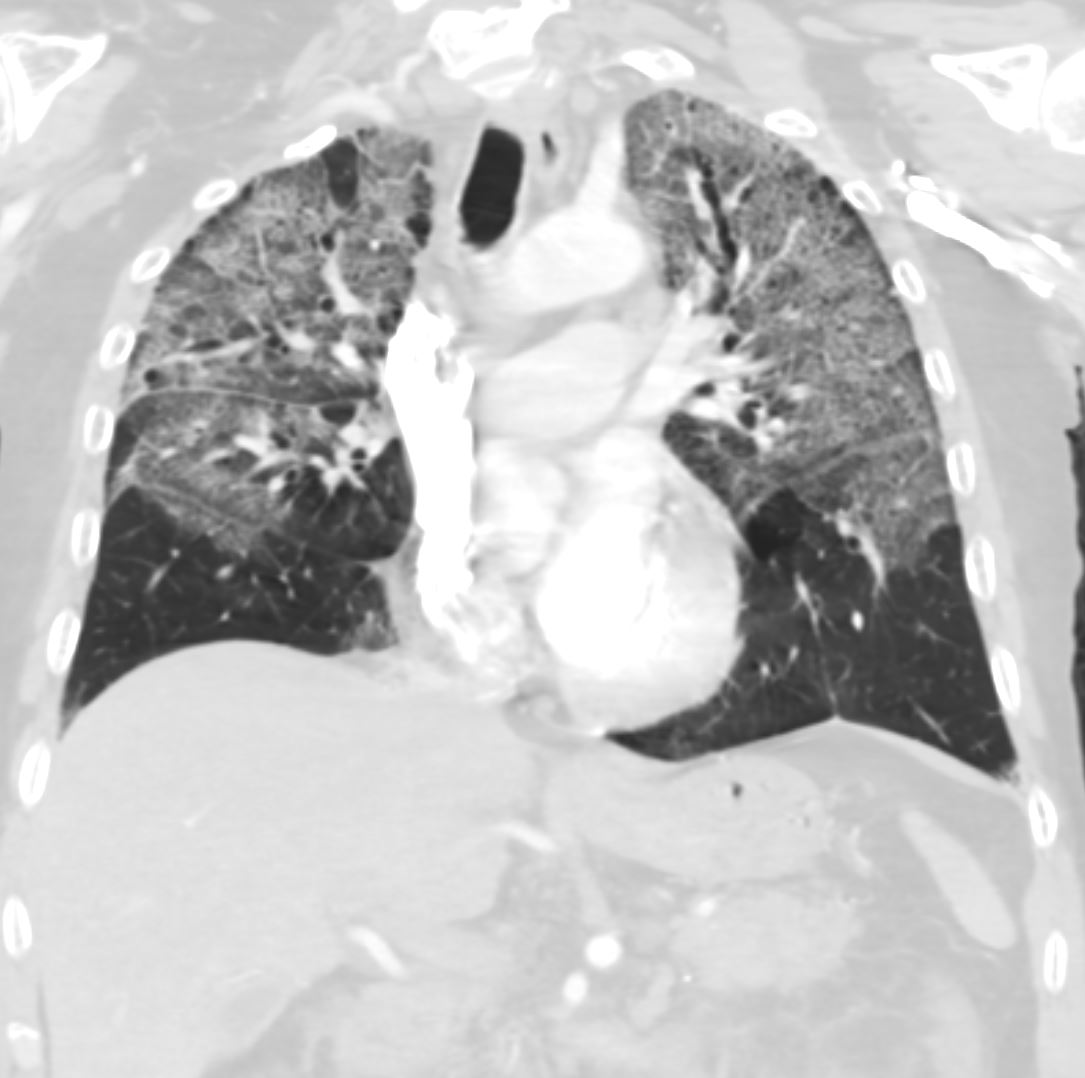
55-year-old male with substance use disorder presents with progressive and now more severe dyspnea. Coronal CT through the mid lung fields shows upper lobe predominant ground glass changes with thickening of the interlobular septa and a “crazy paving” appearance is suggested. The superior segments of the lower lobes are also involved. Thickening and irregularity of the right and left major fissures and the transverse fissure are noted. LVH is suggested.
Progressive inhalational pneumonitis from smoking or cocaine inhalation was suspected. DIP and hypersensitivity pneumonitis remained in the differential diagnosis
Ashley Davidoff MD TheCommonVein.net 251Lu 135934
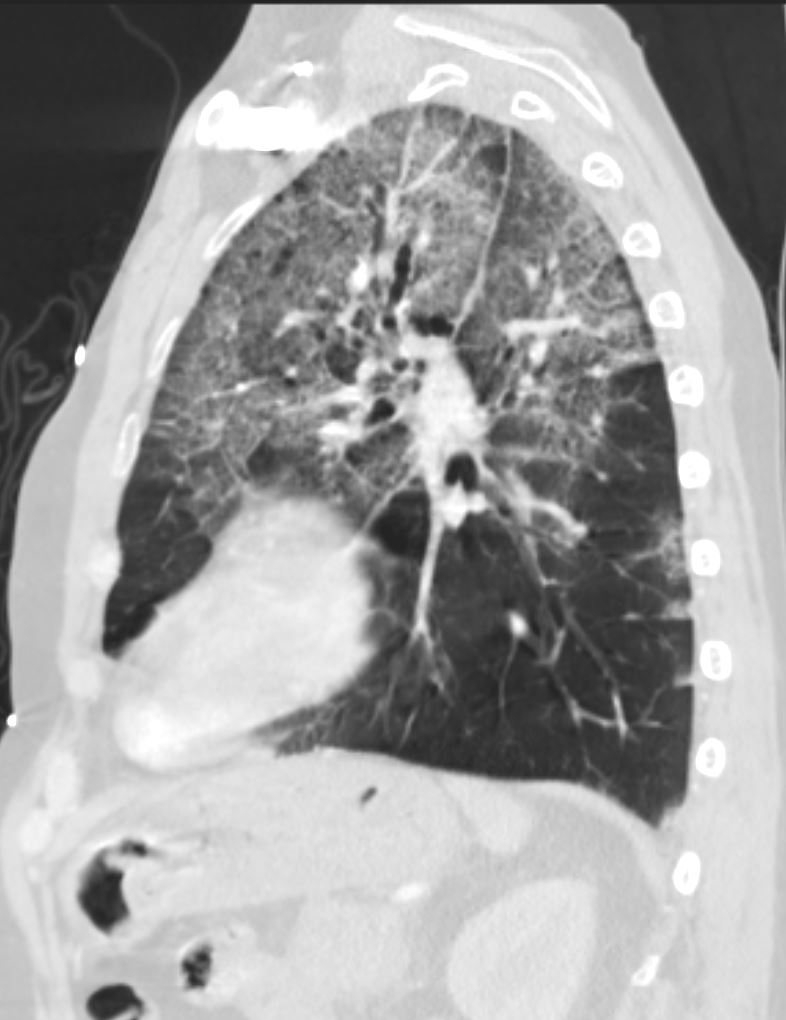
55-year-old male with substance use disorder presents with progressive and now more severe dyspnea. Sagittal CT through the left lung field shows ground glass changes in the upper mid and superior segment of the lower lobe. The fissures of the areas of involved lung are focally thickened. There is subpleural sparing.
Progressive inhalational pneumonitis from smoking or cocaine inhalation was suspected. DIP and hypersensitivity pneumonitis remained in the differential diagnosis
Ashley Davidoff MD TheCommonVein.net 251Lu 135941
“Crazy Paving”
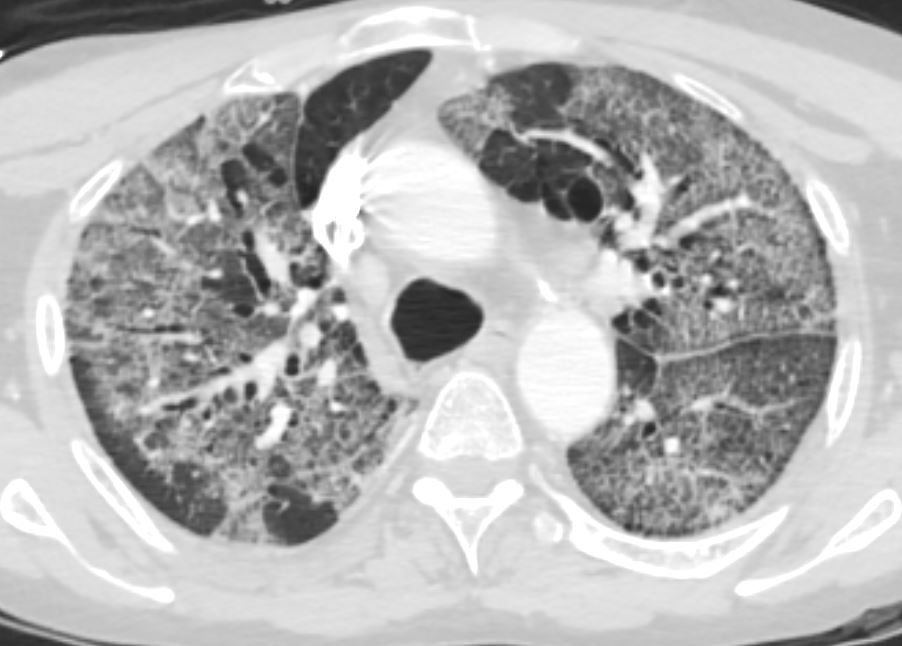
55 year old male with substance use disorder presents with progressive and now more severe dyspnea. CT through the upper lung fields shows extensive upper lobe ground glass changes with thickening of the interlobular septa giving the appearance of “crazy paving”. Thickening and irregularity of the left major fissure is also noted There is bilateral peripheral sparing.
Progressive inhalational pneumonitis from smoking or cocaine inhalation was suspected. DIP and hypersensitivity pneumonitis remained in the differential diagnosis
Ashley Davidoff MD TheCommonVein.net 251Lu 135923
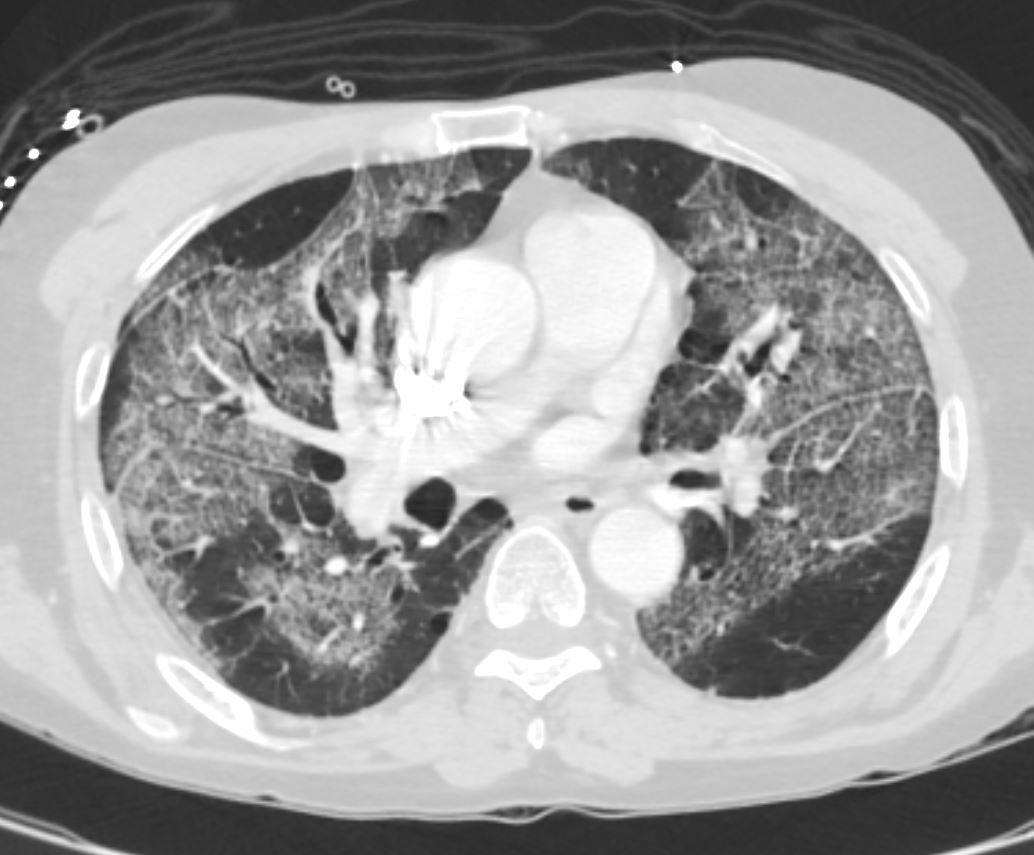
55 year old male with substance use disorder presents with progressive and now more severe dyspnea. CT through the mid lung fields shows extensive upper lobe and superior segmental lower lobe ground glass changes with thickening of the interlobular septa giving the appearance of “crazy paving”. Thickening and irregularity of the major and middle fissures are also noted. There is bilateral peripheral sparing with a batwing distribution
Progressive inhalational pneumonitis from smoking or cocaine inhalation was suspected. DIP and hypersensitivity pneumonitis remained in the differential diagnosis
Ashley Davidoff MD TheCommonVein.net 251Lu 135926
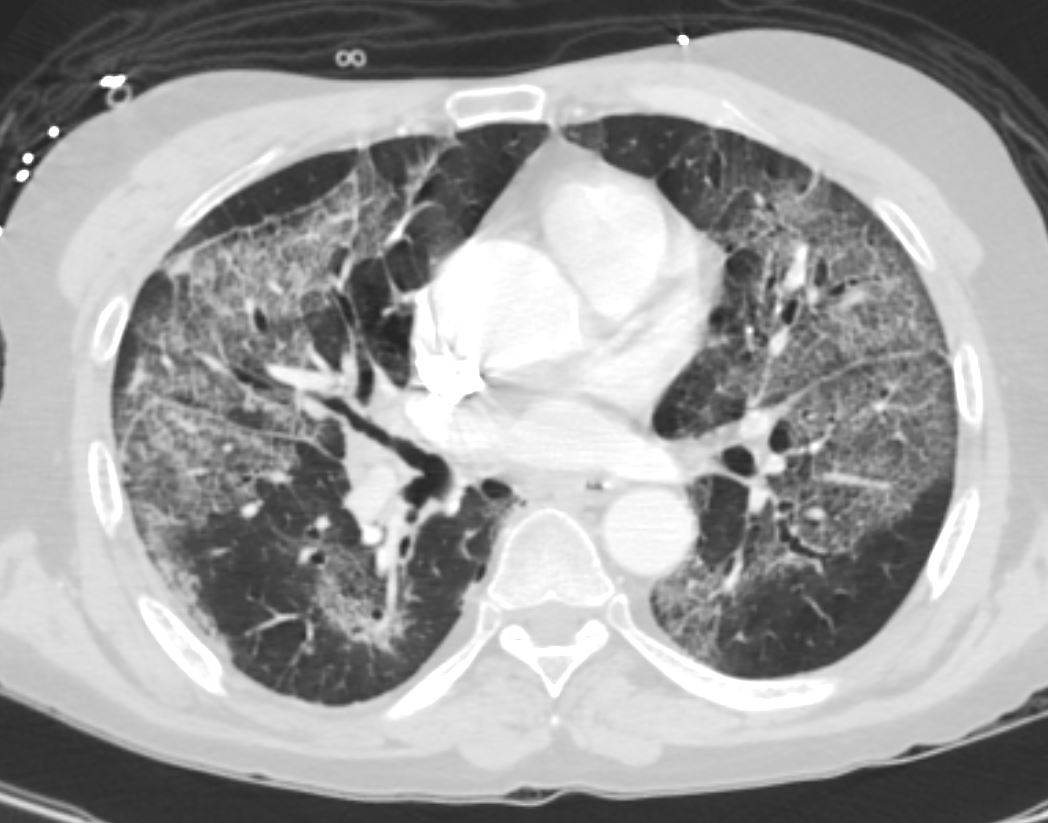
55 year old male with substance use disorder presents with progressive and now more severe dyspnea. CT through the mid lung fields shows extensive upper lobe and superior segmental lower lobe ground glass changes with thickening of the interlobular septa giving the appearance of “crazy paving”. Thickening and irregularity of the major and middle fissures are also noted. There is bilateral peripheral sparing with a batwing distribution
Progressive inhalational pneumonitis from smoking or cocaine inhalation was suspected. DIP and hypersensitivity pneumonitis remained in the differential diagnosis
Ashley Davidoff MD TheCommonVein.net 251Lu 135927
